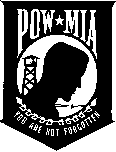American POWs in Southeast Asia and
the Violation of a National Ethic
By Wesley
Fryer.
<-- Return to Table of Contents
4. A Breach of Trust: POWs are left
behind
Despite the development and demonstration of this
American POW ethic throughout the war in Indochina, the ethic was
violated by the political events of 1973 that transpired under the
leadership of President Richard Nixon and Secretary of State Henry
Kissinger. Nixon did not win the Presidential election in 1968 with
the promise of winning the war in Vietnam, but rather with the
promise of "disengaging" American combat forces from their Southeast
Asian quagmire and winning "peace with honor" for the United States
(Franklin 62). As the Nixon administration sought to disengage from
America's land war in Asia, "prisoners of war became diplomatic
hostages, pawns in the war" (Olson 156).
The cease-fire agreement between the United States
and the North Vietnamese was signed in January 1973, and in February
591 American POWs were repatriated to the United States in "Operation
Homecoming." On February 1, 1973, however, President Richard Nixon
sent a secret letter to Vietnamese Prime Minister Pham Van Dong
promising four and one half billion dollars in postwar reconstruction
aid. It is believed that the Vietnamese only released 591 POWs, and
kept several hundred other POWs, because "collateral" was needed to
insure that the United States would fulfill its promise for postwar
reconstruction aid (U.S. Senate Committee Report 5-10). This
conclusion is supported by the available evidence regarding
Vietnamese intentions and perceptions of the United States.
Apparently, the Vietnamese felt they could not trust any of the
Western Powers, in part because the national elections slated to be
held in 1956 had been cancelled by U.S. intervention. On his
deathbed, Ho Chi Minh allegedly told Le Duc Tho and Pham Van Dong
"Don't sign the next agreement until we're certain of the political
outcome," a recommendation which would explain the Vietnamese
reluctance to participate in a complete prisoner exchange in February
1973 (Olson 244-245). Vietnamese fears of the United States failing
to fulfill its $4.5 billion promise were well founded, as the United
States Congress refused to approve this aid after the cease-fire in
1973. When the Watergate scandal caused Nixon to resign from the
presidency several months after the initial prisoner exchange took
place, the Vietnamese were left with a broken promise and hundreds of
American POWs whose chances for repatriation appeared
bleak.
The cease-fire agreement which the United States
signed with Vietnam was a political victory for Nixon, but did not
represent a complete victory for the North Vietnamese. Between the
signing of the cease-fire agreement in January 1973 and the fall of
Saigon in 1975, North Vietnamese fears that American military force
could again be directed against Hanoi were well founded. Nixon had
promised the South Vietnamese government, in a secret letter written
on January 5, 1973, that "we [the United States] will respond
with full force should the settlement be violated by the North
Vietnamese" (Olson 254). The sustained will of the American
government to use force against North Vietnam prevented total success
for Ho Chi Minh's followers: the unification of North and South
Vietnam (Tang 191).
Because of the threat posed by American military
forces, the Vietnamese could not be certain that the emergence of
additional American POWs after the official prisoner exchange in
February 1973 "would not trigger a return of American B-52s over
Hanoi" (Daly). This perception of the North Vietnamese was
strengthened by an order issued by the U.S. Department of State to
the Department of Defense on April 12, 1973, which stated "There are
no more prisoners in Southeast Asia. They are all dead" (Stevenson
19).
This government position, a "presumptive finding"
that "The sad conclusion is that there is no evidence that . . .
missing Americans are still alive," was reaffirmed in 1975 in the
Mongomery report of Congress (Dolan 43). Although half the membership
of the Congressional committee which produced the Mongomery report
publicly protested this conclusion and held that there were good
reasons for not "closing the books" on the POW issue, President Jimmy
Carter chose to ignore their protests and accept the conclusion that
all American POWs in Southeast Asia were dead (Dolan
48-49).
These official declarations of the U.S.
government, which followed the empty promise for reconstruction aid
given by Nixon, were some of the most important factors leading to
the current relationship between the United States and Vietnam
regarding American POWs. Presently, as in 1975, the governments of
Vietnam and the United States both regard "live American POWs" to be
a political liability. Officially the United States declares it
"operates on the assumption that some American Prisoners of War
remain alive," but the past declarations of the U.S. government make
our position clear to the Vietnamese. The U.S. has declared that
American POWs in Southeast Asia are dead, and in doing so appears to
have truly "kissed the boys goodbye." The return of living American
POWs from Southeast Asia today would not only be an embarrassment to
the U.S. government who declared them dead many years ago, but would
also be a major obstacle to normalized relations with the Vietnamese
government which are presently being pursued with renewed vigor
(Baker 14).
Proceed to:
Section 5: Troubling
Evidence that American POWs were abandoned
You are viewing my paper:
American POWs in Southeast Asia and the Violation of a National Ethic"

Return to my
POW/MIA homepage
© Copyright 1991 by
Wesley
Fryer.
Contact Wesley using
this web form

This work is licensed under a Creative Commons Attribution 3.0 Unported License.

